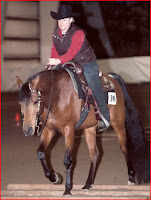
breeds and the art of horsemanship. And, for trainers hopefully to share our knowledge with others.
Yes, I like to win just as much as the next person. Winning has put bread and butter on my table for many, many years, but if you forget to put the horses first and foremost things just get kind of crazy.
I take great pride in my personal horsemanship and training abilities and I take pride in my horses and my riders and their accomplishments. I think demonstrating good horsemanship skills influence others to try a little harder. It furthers the cause, so to speak. Horses are such a privilege to be around and to learn about. They are great teachers as well if we're willing to listen. Being a horseman is a lifelong journey for those of us who have chosen this path.
I believe horses are one of the greatest gifts mankind has received over the millennia. Horsemanship has evolved for thousands of years and I hope everyone involved with horses feels great pride in being a part of the world-wide community of horsemen. Best of luck to those of you who are heading out to show, and warm thoughts to others who are heading down the trail - whatever you enjoy, remember it's about our love of the horse! See you next week, JD.


